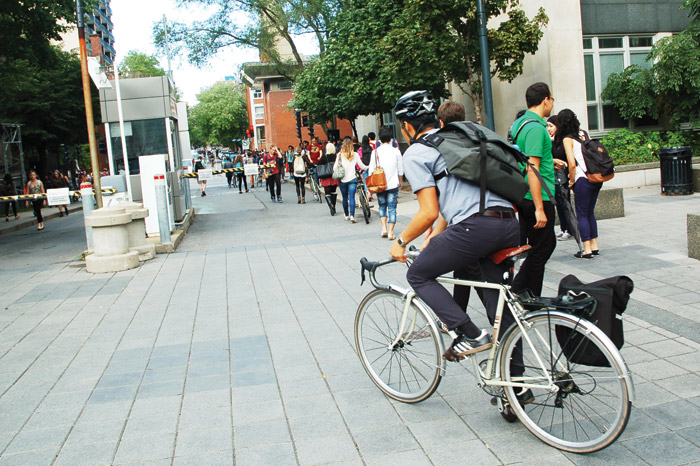A shared space on campus for bikes and pedestrians could serve as a solution for the cycling regulations debate, according to Students’ Society of McGill University (SSMU) VP External, Amina Moustaqim-Barrette, who is also a member of the McGill Cycling Working Group.
The group was created in Fall 2013 with the goal of seeking out a compromise between no regulations regarding bicycles and disallowing bikes.
The working group also consists of members of the Office for Students with Disabilities (OSD), Security Services, professors, and student representatives.
“The mandate of the working group is to consider whether and how mounted cyclists can safely be accommodated on the downtown campus without compromising the pedestrian-friendly atmosphere,” its website reads.
The working group advised Robert Courvette, associate vice-principal of University Services in the spring of 2014 on a shared- space approach to address cycling regulations.
“The approach of shared space, as explained and recommended by the McGill Cycling Working Group, is designed to minimize separation between vehicles, cyclists, and pedestrians, and forces all users to share the space,” Moustaqim-Barrette explained. “The pedestrian is considered the primary user and has the right of way at all times. Despite the dismount policy, this is basically what we see on campus today.”
Bimochan Niraula, a member of the working group and a representive of the Flat Bike Collective, stressed the importance of a policy which would allow bikes on campus.
“There definitely needs to be a way for bikes to go through campus,” Niraula said. “We would be very happy if those were actually bike lanes. Then, we could ask people to move away from the bike lanes and vice-versa [….] University Street is absolutely dangerous—you are going against the traffic on a one way street—so people have to use campus anyway.”
Moustaqim-Barrette praised the approach of the working group which would emphasize space used by both pedestrians and bicyclists.
“I believe that a shared space approach would absolutely serve all members, both internal and external, of the community and make campus more welcoming and inclusive,” she said. “Thanks to the abundance of research by the McGill Cycling Working Group, it seems like there is a consensus over [creating a] shared space with a speed limitation.”
Currently, the recommendations are waiting responses from the university’s senior administration.
“Members of the senior administration, as I understand it, received the report individually, but have not had a chance to discuss it,” Director of Internal Communication Doug Sweet explained. “This is going to happen in the near future.”
Whether the group’s recommendations will result in any substantial changes for the McGill campus is still unknown.
“What the results of those discussions will be, the outcome is unclear,” Sweet said. “The administration is free to accept or reject the recommendations as they see fit.“
Pierre-Luc Auclair from the Montreal Bike Coalition, a group representing citizens and organizations of the Montreal region interested in urban cycling, spoke about how McGill’s campus is a unique challenge for legislation.
“Other universities such as UQAM or Concordia do not face those challenges as they rely on the city’s existing infrastructure, [resulting in] municipal regulations,” Auclair explained.









